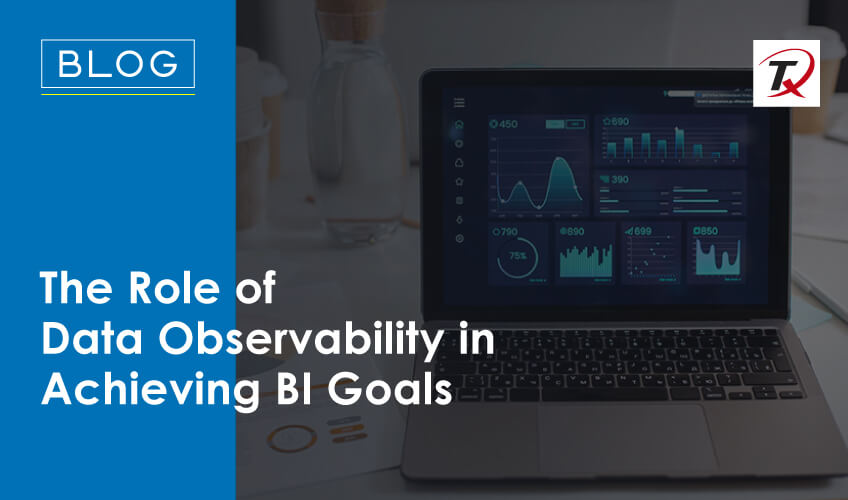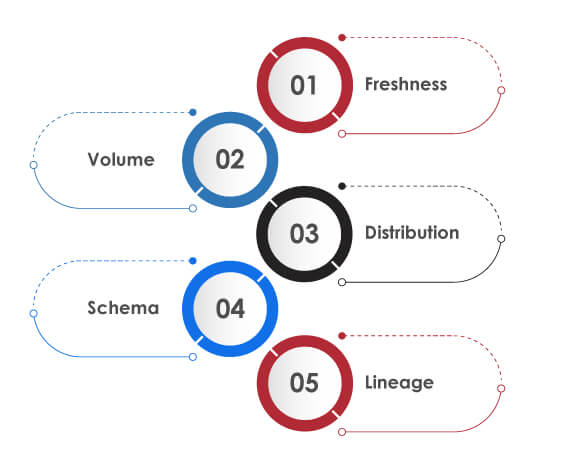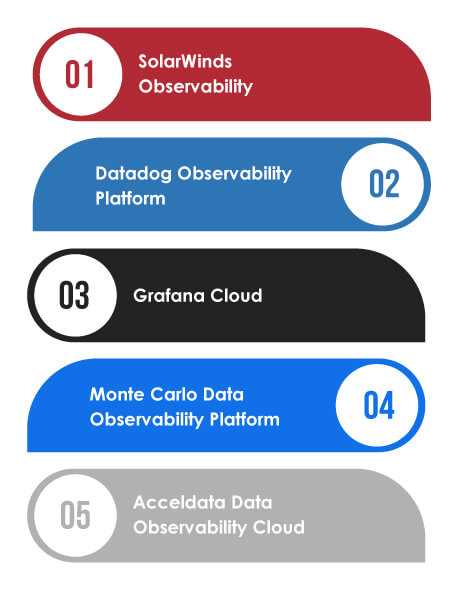Recommended Blogs
The Role of Data Observability in Achieving BI Goals

Table of Content:
- What is Data Observability?
- Importance of Data Observability in Business?
- Five Pillars of Data Observability
- What are the Data Observability KPIs and Thresholds Driving BI?
- How Does Data Observability Help in Achieving BI Goals?
- How Agentic AI Elevates Data Observability?
- Real‑World AI Use Cases and Tools in Data Observability
- Top 5 Data Observability Tools
- Summary
- Why Partner with Tx for Data Observability Services?
Data is one of the integral aspects of the current digital business environment. Businesses rely heavily on data insights to make important decisions, making it necessary for data to be accurate, reliable, and high-quality. According to Gartner’s study, 20% of analytic insights deliver business outcomes, while poor data quality is one of the reasons why businesses fail to achieve their initiatives. Gaining data insights is necessary, but understanding its health in the system is equally important. It includes ensuring there isn’t missing, misused, or incorrect data. This is where data observability comes in.
That is why AI and ML have become crucial components of data observability. Machine learning algorithms can scan massive data pipelines and spot unusual patterns much faster than manual checks. Conversely, AI can automate root cause analysis, saving teams hours they’d otherwise spend hunting for why a pipeline broke or why duplicate data appeared.
This blog breaks down its core pillars, real-world benefits, and the tools you can use to keep your data and decisions reliable.
What is Data Observability?
Data observability means understanding the health of the data within the system. The process involves continuously monitoring and gaining insights into business intelligence systems’ data flows. It helps ensure data is reliable, secure, and accurate, providing a clear view of the data lifecycle within the business.
The process involves using various logs and metrics to monitor data health. It identifies issues like data downtime, integrity problems, and anomalies and ensures high-quality data. Data observability tools identify real-time problems to provide quick resolution and minimize impact on BI operations.
It understands where the data comes from, how it flows and transforms across systems, and how it’s used. It also maintains data integrity and compliance, which is necessary in today’s digital business environment.
As businesses rely on data-driven decision-making, data observability ensures that the data necessary for business decisions is trustworthy and up to date. When integrated into BI strategies, businesses can improve decision-making, better understand customer requirements, and quickly adapt to market trends.
Importance of Data Observability in Business?
Data observability provides the necessary tools to monitor and understand data in digital business operations. The process offers insights crucial for operational efficiency and strategic planning. To understand its importance in business, let’s look into the following factors:
• Provides monitoring data in real-time and quickly identifies and rectifies issues. It also reduces downtime by resolving issues quickly before they escalate and optimizing overall operational efficiency.
• Instead of solving data issues, data observability allows businesses to identify and prevent potential issues. This saves time and resources and maintains a high level of service quality.
• Businesses grow thanks to informed decisions. Data observability maintains data accuracy and ensures it is up to date when used during the decision-making process. It results in reliable and effective BI decisions that directly impact the success rate.
• With the growing importance of data privacy laws and regulations due to tech innovations, observability allows businesses to maintain compliance. It offers insights into data lineage and ensures data handling fulfills regulatory standards.
• Data grows as the business grows. Observability tools are easy to scale and provide continuous insights, regardless of the data volume. This is necessary for businesses that want to grow and expand to remain competitive in the digital age.
• It plays a crucial role in understanding customer behaviour and preferences. Reliable data offers better customer insights, and businesses can effectively tailor their products or services to meet customer demands.
Five Pillars of Data Observability
Data observability is necessary for the robust functioning of BI systems. The process depends on five key pillars for maintaining data integrity and usability. Having a clear understanding of these pillars enables businesses to utilize data effectively and make informed decisions:

Freshness:
Freshness means data relevancy and currency within the system. It ensures data is up-to-date and is available when necessary. It is important for processes requiring real-time data like stock trading platforms or real-time analytics in retail. Fresh data facilitates predictive analytics accuracy and decision-making. In the digital business market, stale data would cause errors during decision-making, leading to missed opportunities. Freshness checks alert teams about data update lapses or delays so that correct action can be taken.
Volume:
It involves monitoring and keeping track of the amount of data produced and processed. Having volume checks helps identify inconsistencies that could result in issues during data creation or collection processes. For example, a sudden data volume drop could be due to a failure in the data ingestion pipeline. A sudden spike might be due to duplicate data or data collection errors. By monitoring data volume, businesses can keep a consistent data flow and use it for analytics and reporting.
Distribution:
Analyzing data distribution is necessary to know the range and spared of data values. This pillar identifies dataset anomalies and outliers. For example, a sudden change in transaction value distributions in financial software could cause fraudulent activity. Data distribution observation maintains the predictive model’s integrity and ensures accurate analytics using representative data.
Schema:
This pillar focuses on data structure and format and involves monitoring changes in data schema (addition, deletion, or modification of data fields). This is useful in cases where multiple systems consume data with specific structure requirements. Changes in the schema can cause incorrect data interpretation or break integrations. Constant monitoring detects issues early and maintains data consistency and reliability across the organization.
Lineage:
Data lineage defines the data flow through the pipeline (origin to final destination). This pillar offers a clear view of data transformation and its flow across multiple systems. Lineage tracking is necessary to diagnose issues, understand their impact, and ensure accountability. It is important in the regulatory compliance process, as businesses need to prove the origin of the data and its transformation.
What are the Data Observability KPIs and Thresholds Driving BI?
To keep data pipelines healthy and trustworthy, it’s important to keep an eye on certain KPIs and define appropriate thresholds. These measurements are like early warning flags that assist teams in finding problems before they affect AI models or business decisions.
Data Drift: Check for KL divergence of more than 15% between data distributions throughout time frames. A lot of drift can mean that the quality of the data or the way the source works has changed, and this needs to be looked into.
Null Rates: Keep null or missing values below three percent for critical features used in models or reports. Higher null rates can degrade model accuracy and lead to unreliable insights.
Freshness SLA: Make sure that streaming pipelines send data with a delay of less than five minutes. For real-time analytics and operational decisions, data needs to be up to date.
Outlier Rate: Set alarms for continuous variables when z-scores go above 3, which means the values are very high and could affect the analysis or show mistakes.
By monitoring these KPIs, businesses can ensure that their data is accurate and trustworthy. This will ensure that BI and AI projects go smoothly and provide value.
How Does Data Observability Help in Achieving BI Goals?
With the digital business environment advancements, the need to interpret data accurately is highly important. Data observability ensures that the data supporting BI tools is reliable, resulting in effective business decisions and strategies.

Data Accuracy and Reliability
Accurate data is crucial for effective BI. Businesses can use data observability tools to monitor data quality and set alerts for inconsistencies to improve the efficiency of BI insights and decision-making. It will help prevent costly mistakes caused by data errors.
Manage Issues Swiftly
Observability tools facilitate real-time issue identification, allowing businesses to take immediate action. This approach helps prevent minor problems from escalating and ensures BI tools operate on clean and accurate data. For instance, setting immediate alerts for data pipeline failures can save time and resources.
Risk Management
Implementing comprehensive data observability procedures enables businesses to anticipate and mitigate risks faster and more effectively. It gives a complete view of data health and market trends, allowing businesses to make informed decisions on risk management, a key aspect of BI.
Reporting and Compliance
It becomes easy to track data lineage with observability tools, making it feasible to report on data usage and transformation within the business processes. This is also important for compliance with data protection regulations. Detailed reporting also provides reliable insights from BI tools.
Improved BI Performance
Observability tools maintain the data quality and ensure timely delivery for BI operations. It leads to better performance of BI tools as they provide faster and more accurate insights based on updated data.
Better Understanding of Customer Behavior
High-quality data helps businesses better understand their customer behaviour and requirements. Observability tools accuracy of data used in analysing customer preferences and trends, resulting in effective engagement strategies.
How Agentic AI Elevates Data Observability?
AI today does more than watch your data. Agentic AI finds problems and acts on them automatically. If there’s a sudden drop in data volume because of a broken pipeline, agentic AI can detect it, trace the cause, and trigger a fix or send a clear alert right away.
It can also catch changes in data fields, check what they affect, and stop bad data from spreading across your systems. It cuts down on manual checks and keeps pipelines healthy for BI and ML.
A few good practices make this work well:
Train your AI on real patterns– Use historical data to teach AI what normal looks like to flag real issues, not false alarms.
Automate root cause tracing– Let AI tell you what went wrong and why. It makes fixes happen faster and stops problems from happening again.
Put the most important things first– Smart models can sort alerts by how they affect the business, so teams can repair the most important things first.
Keep a person in the loop– Automation is great, but it still needs to be watched. Use AI and human checks together for important fixes.
Real‑World AI Use Cases and Tools in Data Observability
This section breaks down how AI shows up in day-to-day data observability work and which tools make it happen.
Automated Anomaly Detection
AI models can scan billions of data points and flag unusual spikes, drops, or trends that humans might miss. For example, Monte Carlo uses machine learning to catch broken pipelines or missing records in real time, then alerts the right team instantly.
Predictive Data Quality Monitoring
AI doesn’t just find problems but also predicts them. Tools like Acceldata combine AI with historical trend data to forecast where issues might appear next, so you can fix them before they disrupt BI reports or ML models.
Intelligent Root Cause Analysis
When data pipelines break, AI can trace the problem back to its source in seconds instead of hours. Datadog and Bigeye both use AI-driven diagnostics to map out exactly where the issue started, helping teams fix it faster and avoid repeat errors.
Smart Alert Prioritisation
Too many alerts overwhelm teams. AI filters noise by ranking issues based on severity and business impact. It helps data engineers focus on what really matters and keeps observability efficient.
Continuous Learning
As time goes on, AI models and observability tools have become smarter. They figure out what normal looks like in your systems and modify when new data sources, schema changes, or user behaviors show up. It implies that your data monitoring is kept up to date without you having to do it by yourself all the time.
Top platforms bringing AI into observability:
Monte Carlo helps businesses catch broken data pipelines and missing records in real time with AI-powered anomaly detection and automated alerts.
Datadog combines AI-driven diagnostics with deep observability, helping teams quickly trace the root cause of data issues across complex systems.
Acceldata uses predictive monitoring powered by AI to forecast data pipeline failures before they cause downtime or disrupt business operations.
Bigeye applies machine learning to monitor data quality at scale, detect unexpected changes, and prioritize alerts based on business impact.
Top 5 Data Observability Tools
When choosing data observability tools, make sure to select ones that sync with BI-specific needs. Here are the top 5 data observability tools for 2024:

SolarWinds Observability:
It provides a comprehensive and unified view of IT infrastructure, which includes data from logs, traces, metrics, etc. This tool effectively manages and monitors distributed environments, and it supports open-source frameworks and third-party integrations.
Datadog Observability Platform:
Datadog is known for handling complex technology stack as it can easily integrate with over 700 technologies (such as AWS, Kubernetes, Slack, etc.). This observability platform combines traces, logs, and metrics for E2E visibility. It has an AI-powered anomaly detection feature that monitors various technologies.
Grafana Cloud:
This tool focuses on observability cost management. It facilitates real-time monitoring and customization of dashboards, enabling effective management of costs.
Monte Carlo Data Observability Platform:
This observability platform automates root cause analysis and offers a detailed view of data (including data lakes, warehouses, BI tools, etc.). The Monte Carlo data observability platform is easy to set up and seamlessly integrates with data stacks.
Acceldata Data Observability Cloud:
Acceldata is a multi-dimensional platform focusing on data reliability, data pipeline performance optimization, and reduction of inefficiencies. The product stack easily integrates with data stacks like ETL tools and orchestration pipelines.
Summary
Data observability is an important asset for achieving business intelligence goals in the digital business environment. It ensures that data used for decision-making is accurate, reliable, and of high quality. It involves a holistic approach to understanding data health within the system and addressing critical issues like data integrity and downtime. Observability impacts various business aspects, from enhancing customer insights to ensuring data-driven compliance. However, one must partner with a professional data observability service provider like TestingXperts to ensure its effective integration with BI operations.
Why Partner with Tx for Data Observability Services?
Trustworthy data is vital for today’s enterprises using analytics to identify opportunities and feed AI/ML models to automate decision-making. TestingXperts offers comprehensive data observability solutions to ensure your data is reliable and you get the following benefits:
• Eliminate risks associated with inaccurate analytics by detecting and addressing data errors before they disrupt your business and lead to costly downstream problems.
• Use effective solutions to trace the root cause of an issue, along with remediation options to resolve issues efficiently and quickly.
• Proactively identify and eliminate issues to minimize the cost associated with adverse data events.
• Empower your data engineers and other stakeholders with a thorough understanding of your data to support your digital transformation initiatives.
• Implement AI and RPA-driven quality engineering for efficient and effective automation.
To know more, contact our QA experts now.
FAQs
Data observability is the ability to monitor, track, and understand the health of data across systems. It helps teams find problems like broken pipelines, missing data, or discrepancies early so they can repair them right away and avoid business problems or incorrect decisions that come from having bad or inaccurate data.
Modern businesses rely heavily on data, and any error can lead to costly decisions. Data observability helps teams catch problems before they impact users. It builds trust in data, speeds up root cause analysis, and keeps operations running smoothly, especially when data systems are complex and constantly evolving.
Some of the most widely used data observability tools include Monte Carlo, Datadog, Bigeye, and IBM Databand. These tools help teams detect data quality issues, monitor pipelines, and receive alerts when something breaks, ensuring better performance and faster resolution of problems across the data stack.
Data observability tracks how data is used, where it comes from, and who accesses it. This helps organisations maintain data integrity and meet compliance standards like GDPR. It also ensures proper data governance by keeping everything traceable, auditable, and aligned with regulatory and internal policies.
Discover more
